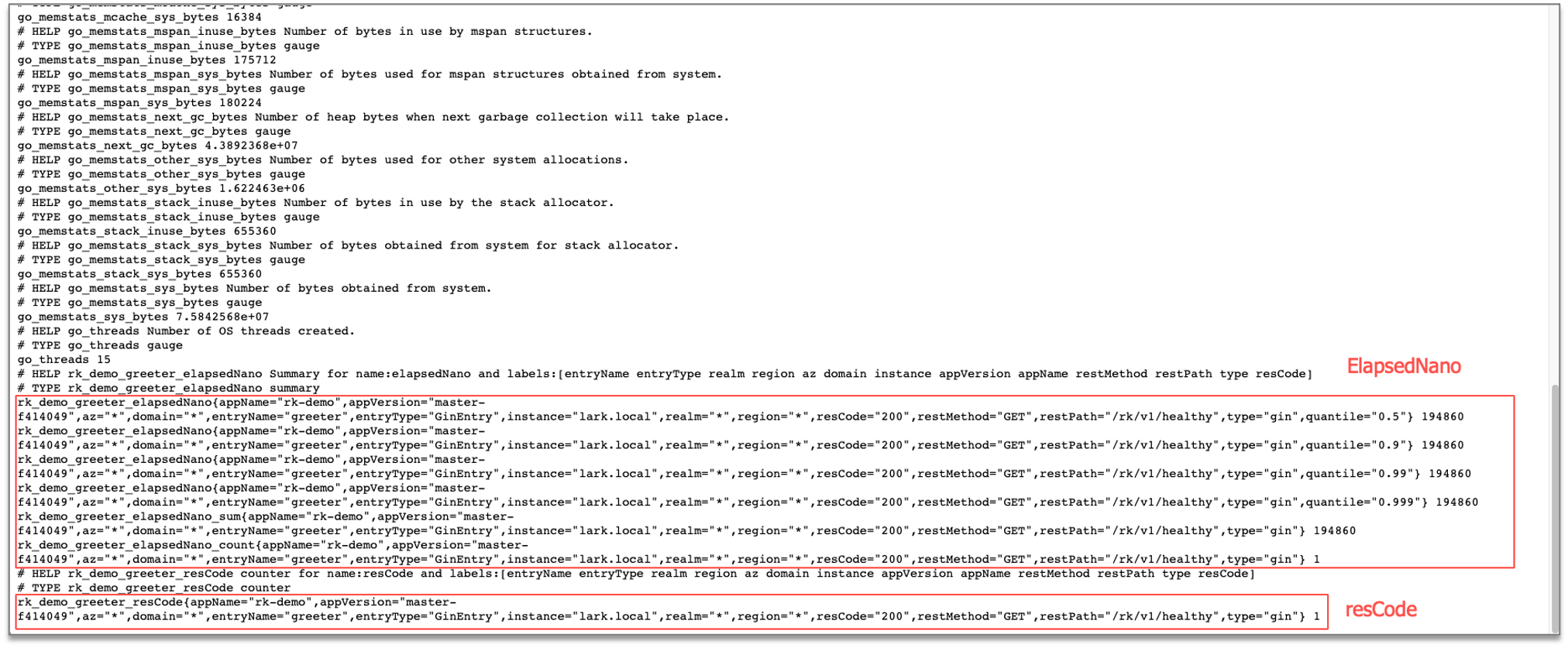Prometheus
启动 Prometheus 中间件。
安装#
go get github.com/rookie-ninja/rk-boot/v2
go get github.com/rookie-ninja/rk-echo
选项#
| 名字 | 描述 | 类型 | 默认值 |
|---|---|---|---|
| echo.middleware.prom.enabled | 启动 Prometheus 中间件 | boolean | false |
| echo.middleware.prom.ignore | 局部选项,忽略 API 路径 | []string | [] |
概念#
Prometheus 中间件会默认记录如下监控。
| 监控项 | 数据类型 | 详情 |
|---|---|---|
| elapsedNano | Summary | RPC 耗时 |
| resCode | Counter | 基于 RPC 返回码的计数器 |
上述三项监控,都有如下的标签。
| 标签 | 详情 |
|---|---|
| entryName | Entry 名称 |
| entryType | Entry 类型 |
| domain | 环境变量: DOMAIN, eg: prod |
| instance | 本地 Hostname |
| restMethod | eg: GET |
| restPath | eg: /rk/v1/alive |
| resCode | 返回码, eg: 200 |
例子
rk_prom_elapsedNano{domain="*",entryName="greeter",entryType="EchoEntry",instance="lark.local",resCode="200",restMethod="GET",restPath="/v1/greeter",quantile="0.5"} 88645
...
rk_prom_resCode{domain="*",entryName="greeter",entryType="EchoEntry",instance="lark.local",resCode="200",restMethod="GET",restPath="/v1/greeter"} 1
快速开始#
1.创建 boot.yaml#
---
echo:
- name: greeter
port: 8080
enabled: true
prom:
enabled : true
middleware:
prom:
enabled: true
# ignore: [""]
2.创建 main.go#
package main
import (
"context"
"fmt"
"github.com/labstack/echo/v4"
"github.com/rookie-ninja/rk-boot/v2"
"github.com/rookie-ninja/rk-echo/boot"
"net/http"
)
func main() {
// Create a new boot instance.
boot := rkboot.NewBoot()
// Register handler
echoEntry := rkecho.GetEchoEntry("greeter")
echoEntry.Echo.GET("/v1/greeter", Greeter)
// Bootstrap
boot.Bootstrap(context.TODO())
boot.WaitForShutdownSig(context.TODO())
}
func Greeter(ctx echo.Context) error {
return ctx.JSON(http.StatusOK, &GreeterResponse{
Message: fmt.Sprintf("Hello %s!", ctx.QueryParam("name")),
})
}
type GreeterResponse struct {
Message string
}
3.验证#
发送请求
$ curl "localhost:8080/v1/greeter?name=rk-dev"
{"Message":"Hello rk-dev!"}
Prometheus 客户端:
http://localhost:8080/metrics

